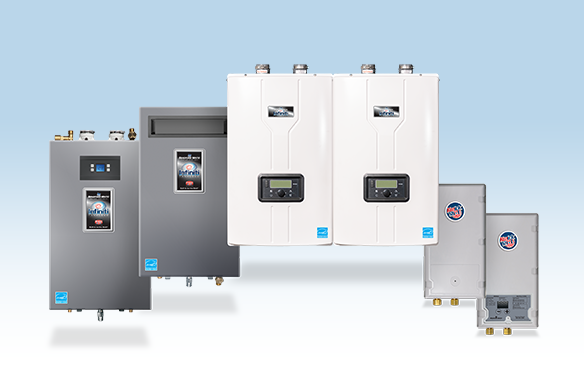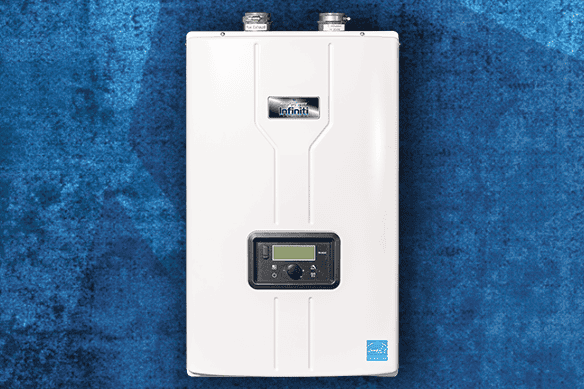Learning About The Upsides Of Continuous-Flow Water Heaters
Learning About The Upsides Of Continuous-Flow Water Heaters
Blog Article
What're your thoughts concerning 5 Benefits of Tankless Water Heaters?

In a globe where comfort and performance preponderate, it's no surprise that homeowners are continuously looking for smarter ways to manage their home's energy usage and convenience. One innovation that has gradually gained appeal is the tankless hot water heater. However exactly what makes these systems attract attention from the traditional tank-based versions the majority of us matured with? Allow's dive in and check out the advantages of tankless water heaters, helping you decide if it's time to make the button in your house.
Intro
Image this: you enter the shower after a lengthy day, expecting a soothing waterfall of warm water, just to be greeted by icy droplets due to the fact that the last individual utilized everything up. Audio acquainted? Traditional hot water heater store a set amount of hot water, implying you're at the mercy of that container's supply. Tankless systems, on the other hand, warmth water on demand. Say goodbye to going out mid-shower, say goodbye to wrestling with routines simply to make sure hot water is readily available.
Recognizing Tankless Water Heaters
What Are Tankless Water Heaters?
Tankless water heaters, sometimes known as on-demand or instantaneous hot water heater, supply hot water just as it's needed. As opposed to keeping gallons of pre-heated water, these devices kick into activity the minute you turn on the tap. Water goes through a warmth exchanger, warming up in real-time, indicating you obtain a continuous circulation of hot water without the requirement for a big container resting idly by.
How Do They Differ from Traditional Systems?
Conventional heaters hold a storage tank of hot water, utilizing energy to keep that container at a constant temperature. Tankless devices get rid of the standing supply, minimizing squandered power and the large impact of a large cyndrical tube. Essentially, you're updating from a "accumulation" way of thinking to a "made-to-order" method.
Usual Sorts Of Tankless Units
Tankless hot water heater generally can be found in two varieties: gas and electrical. Gas designs often tend to supply higher flow rates, suitable for bigger families, while electrical designs often serve smaller sized homes and are usually simpler to set up. In addition, some systems are developed for point-of-use (offering one component) while others can deal with the whole home's warm water demands.
Key Advantages of Tankless Hot Water Heater
Power Efficiency and Cost Cost Savings
No more heating a giant container's well worth of water and maintaining it cozy throughout the day. Tankless heating systems reduce standby power losses, which can decrease energy expenses. While the first expense could be greater, the long-lasting cost savings frequently justify the investment.
3. Space-Saving Style
If your home is short on storage space, removing the bulky storage tank maximizes beneficial room. Tankless devices are small and can usually be placed on wall surfaces, concealed in edges, or mounted in limited utility closets without hogging the entire room.
4. Longer Lifespan
A well-kept tankless hot water heater can outlast its tank-based relative. Traditional storage tanks might last 10-15 years, while tankless versions can keep downing along for 20 years or even more, making them a solid financial investment in time.
1. Unlimited Hot Water Supply
Ever before had to schedule showers so every person gets their reasonable share of hot water? With tankless, that comes to be a thing of the past. As long as the heating system's flow ability isn't exceeded, you can take back-to-back showers without becoming a popsicle.
5. Improved Water Top Quality
Storing water in a storage tank can often bring about sediment accumulation or a somewhat "off" preference. With tankless systems, fresh water is warmed on the spot, minimizing the chances of sediment accumulation and potentially providing cleaner-tasting water.
Considerations Prior To Changing
Though the benefits are compelling, it's smart to think about a few factors before fully committing.
Assessing Your Home's Water Usage Patterns
If your household simultaneously utilizes multiple fixtures with high hot water need, see to it the device's circulation price fulfills your needs. Recognizing your usage patterns helps you pick the appropriate dimension and kind of tankless heating unit.
Upkeep and Treatment Tips
Tankless systems are fairly low maintenance, however they aren't set-it-and-forget-it devices.
Regular Cleaning and Descaling
Hard water minerals can develop in the heat exchanger, impacting effectiveness. Normal descaling (commonly advised yearly) keeps the unit performing at peak performance.
Yearly Specialist Evaluations
A yearly checkup from an expert makes certain small concerns are captured early. They'll assess the unit's performance, look for leakages, and help preserve ideal effectiveness.
Preliminary Investment Costs
Tankless heaters typically come with a greater upfront price tag. Between the system itself and prospective setup alterations, the first price may give you sticker label shock. However keep in mind to view it as a lasting investment.
Installation Demands
Relying on your home's facilities, you might need added electric capacity or gas line upgrades. Guarantee you recognize the installation demands and speak with a specialist to avoid surprises.
Making Sure Proper Ventilation
For gas designs, correct air flow is essential to safely expel exhaust gases. Ensure venting systems are clean and properly set up to stop any kind of possible safety and security risks.
Comparing Different Brands and Models
Not all tankless water heaters are created equivalent.
Looking Into Trustworthy Makers
Try to find credible brands with a history of generating top quality devices. A trustworthy maker commonly offers far better client support and longer warranties.
Setup: Do It Yourself or Professional?
While some property owners delight in taking on projects themselves, tankless installment might not be the very best time to break out the tool kit.
Pros and Cons of DIY Setup
A do it yourself install might save money, but it includes threats. Incorrect installation can lead to inadequacy or safety concerns. If you're handy and have experience, it could be viable-- yet wage care.
Checking Out Evaluations and Individual Comments
User reviews and responses from next-door neighbors or good friends that have actually gone tankless can supply valuable understandings. Sometimes, real-life experiences can be more telling than advertising brochures.
When to Call an Expert Plumber
For a lot of, calling a pro ensures every little thing's done correctly. A professional plumbing recognizes neighborhood codes, sizing needs, and venting parameters, lowering the danger of mishaps.
Making the most of Efficiency
You have actually purchased a tankless system-- currently optimize its performance.
Ideal Temperature Level Setups
The majority of people establish their systems between 120-140 F. Readjusting the temperature level can improve comfort and savings. Experiment to locate a sweet place that does not lose power.
Pairing with Low-Flow Fixtures
Wish to stretch your device's abilities? Consider setting up low-flow showerheads and taps. They lower water use, allowing your tankless system to provide a consistent stream of warm water without stressing.
Ecological Influence
Tankless water heaters align with greener living goals.
Decreased Carbon Footprint
By using less energy and only heating water as needed, tankless systems can lower your home's carbon footprint, decreasing your ecological influence.
Conserving Natural Resources
Less power consumption and much less wasted warm water convert into less natural resources being used, an ecological win-win.
Who Profits Many from Tankless Heaters?
The appeal of tankless heating systems is that they can fit a selection of households.
Big Family Members vs. Single Residents
Huge family members might like the countless warm water supply, while single residents appreciate the power financial savings from not heating an entire storage tank for just a single person's morning shower.
House Owners with Minimal Area
If your home is short on square video, shedding the large storage tank frees up room for various other basics-- or perhaps just more breathing space.
Eco-Conscious Consumers
Going tankless aligns with eco-friendly worths, guaranteeing you're not wasting power or sources.
Future Patterns in Tankless Water Heaters
The world of home appliances is ever-evolving, and tankless water heaters are no exemption.
Improvements in Innovation
R&D is regularly improving warm exchangers, making devices a lot more efficient and long lasting. Future versions could be even quieter, a lot more compact, and much better fit for differing climates.
Smart Home Combination
Visualize changing your hot water heater's temperature level via an application or receiving maintenance notifies on your phone. As wise home technology breakthroughs, we'll see more connection and ease.
Verdict
Picking a tankless hot water heater is greater than simply updating your home's hot water system; it's investing in long-term convenience, power performance, and a greener way of living. By considering your house's water usage, bearing in mind setup demands, and committing to regular maintenance, you can take pleasure in a stable stream of hot water without the baggage of a large tank. As modern technology develops, you can look forward to even smarter, extra effective tankless remedies that not only make your life simpler yet also benefit the planet.
Why You Should Consider a Tankless Water Heater for Your Home
Energy Efficiency and Cost Savings
Tankless water heaters, also known as on-demand water heaters, heat water only when needed. This means they don't waste energy keeping a tank of water hot constantly. This efficiency translates into substantial cost savings on your monthly energy bills.
Endless Hot Water Supply
One of the significant advantages of tankless water heaters is their ability to provide a continuous supply of hot water. Traditional tank water heaters have a limited capacity and can run out of hot water, especially during peak usage times. In contrast, tankless water heaters can provide an endless stream of hot water, making them ideal for larger families or homes with high water usage.
Space-Saving Design
Tankless water heaters are compact and take up significantly less space compared to traditional tank heaters. They can be installed on walls, under cabinets, or even outside, freeing up valuable space in your home. This makes tankless water heaters a great option for smaller homes or properties with limited space for a traditional water heater.
Longer Lifespan and Lower Maintenance
Tankless water heaters typically have a longer lifespan compared to traditional tank heaters. They can last up to 20 years or more with proper maintenance. Additionally, tankless systems are designed with replaceable parts, which can extend their lifespan further and reduce long-term maintenance costs.
Environmentally Friendly
Reducing energy consumption not only saves you money but also benefits the environment. Tankless water heaters contribute to a smaller carbon footprint by using less energy to heat water. Their energy efficiency and ability to minimize standby heat loss make them an eco-friendly choice for environmentally conscious homeowners.
Customized Temperature Control
Tankless water heaters offer precise temperature control, allowing you to set the desired temperature to meet your specific needs. This level of customization ensures you always have water at the perfect temperature for your comfort and usage requirements.
https://beantownservices.com/blog/consider-tankless-water-heater-for-your-home

I came across that entry on Six Benefits of a Tankless Hot Water Heater while exploring the search engines. Sharing is good. You never know, you may be helping someone out. I recognize the value of your readership.
Book Services Report this page